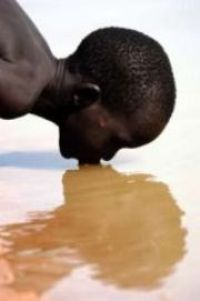South Sudan launches healthy water programme to reduce diseases
September 4, 2008 (JUBA) – The southern Sudan ministry of health launched two days ago the use of chlorine tablets to purify water in Juba town. The initiative aims to reduce occurrence of water borne diseases which blamed for the high child mortality rate in Southern Sudan.
 The production of this water purification product branded as “Waterguard” is supported by the World Bank administered Multi-Donor Trust Fund for Southern Sudan (MDTF-S) through the Ministry of Health in the Government of Southern Sudan (GoSS).
The production of this water purification product branded as “Waterguard” is supported by the World Bank administered Multi-Donor Trust Fund for Southern Sudan (MDTF-S) through the Ministry of Health in the Government of Southern Sudan (GoSS).
Waterborne diseases are caused by pathogenic microorganisms which are directly transmitted when contaminated drinking water is consumed. Contaminated drinking water, used in the preparation of food, can be the source of foodborne disease through consumption of the same microorganisms.
Addressing the “Waterguard” launch, the Director-General of Preventive Health at the GoSS Ministry of Health, John Rumunu said that lack of healthy water and excreta disposal are two main causes for the spread of cholera in southern Sudan. He added that more than 9000 cases of acute watery diarrhea had been reported this year.
According to a household survey of 2006, Southern Sudan has only 40% of improved water sources and mostly in urban areas. The same survey revealed that Southern Sudan has only 6% means of excreta disposal.
Around six million Waterguard tablets have been distributed since April 2007 to more than 15,000 beneficiaries, according to Ms Marcie Cook, the Sudan Country Representative the Population Services International (PSI) which is involved in the implementation of the project besides the health ministry.
Due to the difficulty in changing the behavior of some communities, the PSI strategy aims at using school children and women to pass the hygiene messages to the public using drama and songs.
The multi-donor fund for southern Sudan has allocated 10 million dollars to support GoSS disease control program consisting of hygiene, water and sanitation education and the control of malaria.
(ST)

Saaid Nafe
South Sudan launches healthy water programme to reduce diseases
Untill when our people going to use watergaurd tabets in Juba His ex-cellency the minister of health?Don’t you know that those tabets if misuse are also more dangerous to the communities as the danger of water born diseaes you talk about.To change behavior of communities need first of all propar education which we are lucking it in the most parts of the southern sudan.We have good and sweet water in all parts of the southern sudan but we are lucking good plan how to purify it to our communties in which you blams to be hard to change their behavior.I would like to suggest to you that the 10 million us dollars is enough to clear Juba chornic water problems,starting by building bigs water sefty tanks,extention water piplins and purification of the water than next time move to wau or malakal and follows then to sctter it and wait for another support to scatter also without any good result to our communities.
Justin Maker Bol Maker
South Sudan launches healthy water programme to reduce diseases
Clean water is not just important but a cure and a moved towards purifying water is a great help to our community. The statistical numbers speaks for itself as shown on the article.
Distributing chloride tablet is a temporary suppressant to an epidemic. Any help from international community his highly appreciated, but a permanent cure should come from both the GoSS and its citizen. Water purification system equipments do not really cost that much if a government needs to invest in human health. Mobile water purification systems like the one the U.S.A army uses in Iraq only cost $ 250.000 with 500.000 gallon of water capacity per day. Similar small systems for home use cost about $4.000 with the capacity 400 gallon per day and I have one myself made by GE. This is great investment to mankind regardless of where you live. It is a Goss responsibility to find avenues to improved lives